Visual representation
A visual representation of a PDF signature is the text or image with information about the document's internal signature. Some PDF visualization programs can link visual representations with the signature and signer data and properties.
Each visual representation is always related to only one PDF signature. And each PDF signature can have up to one visual representation.
The sections below show the PDF signatures' visual representation options, parameters, and customizations.
Visual Representation Elements
The visual representation dictionary has three parameters to be defined: position, text, and image. The list below briefly explains those visual representation elements.
Position
The visual representation rectangle can be automatic or manual positioned.
Automatic positioning
We recommend the usage of automatic positioning when it's possible to delimit a region (container) of the PDF page for the insertion of visual representations. This positioning mode inserts and organizes the visual representation within the specified region. The figure below shows the behavior of the automatic positioning. The visual representations are inserted one by one inside the external container, illustrated by the red rectangle.
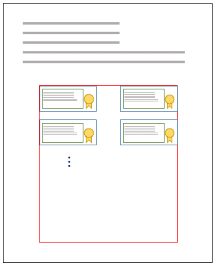
Manual positioning
We recommend the usage of manual positioning when the position of each visual representation, or its regions, is not predefined, as when the user chooses the page and visual representation's position.
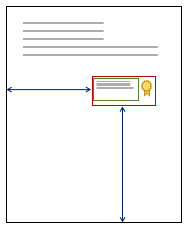
Text
The visual representations have textual information that is configured by the parameter
text.Image
The visual representations can have background images with customizable opacity and alignment. The parameter
imageconfigures these options.
Visual representation positioning
Inside the parameter position, you can define the PDF page for the representation insertion, the position inside the page, and the measurement unit used to inform the position.
The parameter pageNumber sets the page to insert the visual representations. Negative numbers start counting from the end of the document, so -1 is the last page, -2 is the penultimate page, and so on. The special value 0 (zero) means a new blank page, at the end of the document, is used to insert the visual representations.
The parameter measurementUnits sets the measurement unit used to set the positioning parameters. The default unit is "centimeters" but "pdfPoints" is also a valid value.
Manual Positioning
The parameter manual sets the signature rectangle position on the page. The rectangle has the parameters top, bottom, left, right, width, and height, as shown in the figure below.
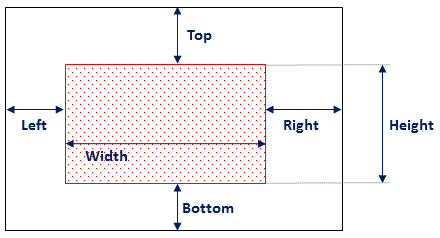
The code below exemplifies how to configure a visual representation to be inserted on the last page of the document; having 7cm of width and 3cm of height; with left and bottom margin of 2.5cm, as shown in the figure below.
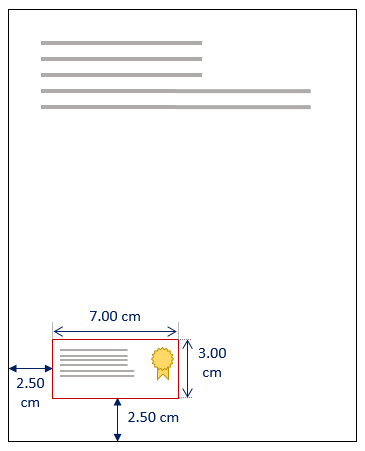
const signer = new PadesSigner();
...
let visual = {
position: {
pageNumber: -1, // Set last page for visual representation insertion
manual: {
width: 7, // Width = 7cm
height: 3, // Height = 3cm
left: 2.50, // Left margin = 2.50cm
bottom: 2.50 // Bottom margin = 2.50cm
}
},
text: {...},
image: {...}
};
signer.setVisualRepresentation(visual);
A visual representation of a PDF signature is the text or image with information about the document's internal signature. Some PDF visualization programs can link visual representations with the signature and signer data and properties.
Each visual representation is always related to only one PDF signature. And each PDF signature can have up to one visual representation.
The sections below show the PDF signatures' visual representation options, parameters, and customizations.
Visual Representation Elements
The visual representation dictionary has three parameters to be defined: position, text, and image. The list below briefly explains those visual representation elements.
Position
The visual representation rectangle can be automatic or manual positioned.
Automatic positioning
We recommend the usage of automatic positioning when it's possible to delimit a region (container) of the PDF page for the insertion of visual representations. This positioning mode inserts and organizes the visual representation within the specified region. The figure below shows the behavior of the automatic positioning. The visual representations are inserted one by one inside the external container, illustrated by the red rectangle.

Manual positioning
We recommend the usage of manual positioning when the position of each visual representation, or its regions, is not predefined, as when the user chooses the page and visual representation's position.

Text
The visual representations have textual information that is configured by the parameter
text.Image
The visual representations can have background images with customizable opacity and alignment. The parameter
imageconfigures these options.
Visual representation positioning
Inside the parameter position, you can define the PDF page for the representation insertion, the position inside the page, and the measurement unit used to inform the position.
The parameter pageNumber sets the page to insert the visual representations. Negative numbers start counting from the end of the document, so -1 is the last page, -2 is the penultimate page, and so on. The special value 0 (zero) means a new blank page, at the end of the document, is used to insert the visual representations.
The parameter measurementUnits sets the measurement unit used to set the positioning parameters. The default unit is "centimeters" but "pdfPoints" is also a valid value.
Manual Positioning
The parameter manual sets the signature rectangle position on the page. The rectangle has the parameters top, bottom, left, right, width, and height, as shown in the figure below.

The code below exemplifies how to configure a visual representation to be inserted on the last page of the document; having 7cm of width and 3cm of height; with left and bottom margin of 2.5cm, as shown in the figure below.

const signer = new PadesSigner();
...
let visual = {
position: {
pageNumber: -1, // Set last page for visual representations insertion
auto: {
container: {
left: 3.00, // Left margin = 3.00cm
right: 3.00, // Right margin = 3.00cm
bottom: 2.00, // Bottom margin = 2.00cm
top: 8.00 // Top margin = 8.00cm
},
signatureRectangleSize: {
height: 3, // Height = 3cm
width: 7 // Width = 7cm
},
rowSpacing: 1.00 // 1.00cm of space between lines
}
},
text: {...},
image: {...}
};
signer.setVisualRepresentation(visual);
Note
The above code specifies a container with variable width and height. There are many other possible behaviors for the external container. For more information, see the article Defining a container.
The figure below shows the expected result after signing a document using the above code.
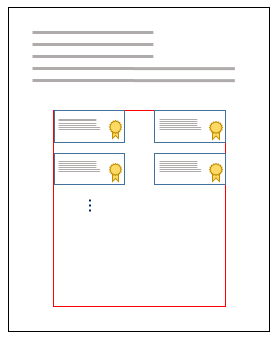
Text and image positioning
Text
Inside the visual representation rectangle, the PKI Express supports the customization of text alignment, positioning, and content. A
containercan be defined to set the text position. If none is defined, the text will fill all the rectangle.The parameter
horizontalAlign("left"or"right") sets the text alignment. The parameterfontSizesets the font size used on the text of the visual representation.The parameter
includeSigningTimemust betrueto include the signature's date and time in the visual representation. Use the parametersigningTimeFormatto customize the data display format.The parameter
textsupports tags that the PKI Express will substitute with the certificate's information.Generic Tags:
Tag Value {{name}}The best guess for the signer's full name (recommended for this purpose over {{subject_cn}}){{national_id}}The best guess for the signer's national ID. For ICP-Brasil certificates, this is resolved to the holder's CPF. For Italian certificates, this is resolved to the holder's codice fiscale. {{email}}Signer's email address {{subject_cn}}The Common Name (CN) part of the certificate's subject name field {{issuer_cn}}The Common Name (CN) part of the certificate's issuer name field ICP-Brasil specific tags:
Tag Value {{br_cpf}}Certificate holder's CPF (CPF do titular/responsável) {{br_cpf_formatted}}Same as {{br_cpf}}but formatted as 000.000.000-00{{br_cnpj}}Company's CNPJ {{br_cnpj_formatted}}Same as {{br_cnpj}}but formatted as 00.000.000/0000-00{{br_responsavel}}Name of the certificate's holder (nome do titular/responsável) {{br_company}}Company name {{br_oab_numero}}OAB's Número de Inscrição junto a Seccional (without leading zeroes) {{br_oab_uf}}OAB's sigla do Estado da Seccional {{br_rg_numero}}Certificate holder's ID number (número do RG do titular/responsável) without leading zeroes {{br_rg_emissor}}Issuing entity of the certificate holder's ID (órgão emissor do RG do titular/responsável) {{br_rg_uf}}State code of the issuing entity of the certificate holder's ID (UF do órgão emissor do RG do titular/responsável) Tags supported for backward compatibility:
Tag Equivalent tag {{signerName}}{{name}}{{signerEmail}}{{email}}{{signerNationalId}}{{national_id}}{{issuerCommonName}}{{issuer_cn}}{{br_oab_numbero}}{{br_oab_numero}}
The code below exemplifies the text positioning withing the visual representation rectangle, as shown in the figure below.
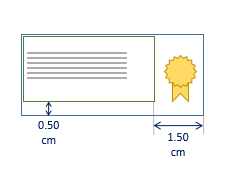
let visual = {
text: { // Visual representation text
text: 'Signed by {{name}}', // Set signer name
container: { // Text container
left: 0,
top: 0,
right: 1.5,
bottom: 0.5
},
includeSigningTime: true, // Include signing time
signingTimeFormat: 'dd/MM/yy H:mm:ss zzz', // Set the signing time format
fontSize: 10.0 // Set the font size
},
position: {...},
image: {...}
};
Image
It's also possible to set a background image within the visual representation rectangle and customize the image's opacity and alignment.
const signer = new PadesSigner();
...
// Set a file reference for the stamp file. Note that the file can be referenced
// later by "fref://{alias}" at the "url" field on the visual representation.
signer.addFileReference('stamp', "imagem_de_fundo.png");
visual = {
text: {...},
position: {...},
image: {
resource: {
url: 'fref://stamp', // Reference to the image.
},
horizontalAlign: 'right', // Right-align image inside the visual representation rectangle.
verticalAlign: 'center', // Vertically centralize the image inside the visual representation rectangle.
},
};
signer.setVisualRepresentation(visual);
- It's possible to remove the visual representation:
signatureStarter.suppressDefaultVisualRep(true);